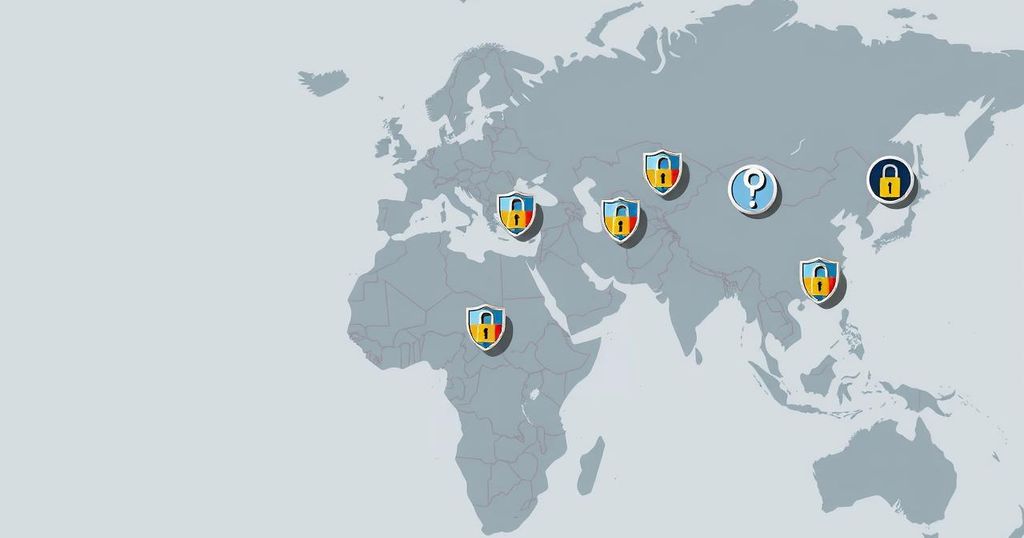On Wednesday, President Trump announced a travel ban affecting twelve countries, citing national security concerns tied to terrorism and visa overstays. Countries like Afghanistan and Iran are singled out for failing to issue documents properly, while Haiti is included due to a surge of undocumented immigrants. Seven other nations face partial restrictions, revealing a complex interplay between immigration and national security.
US President Donald Trump’s latest travel ban, announced on Wednesday, affects twelve countries, particularly in Africa and the Middle East, and will take effect on Monday. This move has sparked controversy as it has been portrayed by Trump as crucial for national security, particularly following a recent attack allegedly perpetrated by an Egyptian national on a Colorado Jewish community. Interestingly, Egypt is not among the banned nations.
The twelve banned countries are labeled as security risks mainly due to accusations of failing to comply with US visa rules. Among these, Afghanistan is under scrutiny. Trump’s presidential proclamation points out the Taliban, deemed a Specially Designated Global Terrorist group, effectively controlling the country. This ban comes on the heels of an earlier indication from the Trump administration suggesting improved conditions in Afghanistan, as they ended Temporary Protected Status (TPS) for Afghans in the US shortly before.
Iran also finds itself at the forefront of Trump’s concerns. The US has branded Iran as a state sponsor of terrorism for years, citing its support for various proxy groups like Hamas and Hezbollah. The proclamation asserts Iran is a significant terrorism source and emphasizes its lack of cooperation on immigration and deportation issues—a volatile backdrop amid ongoing nuclear negotiations.
Moreover, Somalia and Libya are criticized for their connections to terrorism. Trump’s remarks characterize Somalia as a “terrorist safe haven” and emphasize the Somali government’s inability to manage its territory, limiting its governmental effectiveness. Libya, similarly, is cited for its past terrorist activities, which the Trump administration views as a direct threat to American security.
Haiti’s mention in the ban revolves around concerns that “hundreds of thousands” of undocumented Haitian immigrants have entered the US recently. Trump claims these arrivals have led to increased criminal activity and visa overstay issues. The origins of many Haitians date back to the catastrophic earthquake in 2010 and ongoing gang violence.
Chad, Congo-Brazzaville, and Equatorial Guinea face penalties mainly due to their alarmingly high visa overstay rates. Trump’s directive highlights Chad’s 49.54% overstay rate, given in part by a Department of Homeland Security report, calling this a blatant disregard for US immigration laws. Additionally, similar overstay concerns plague both Congo-Brazzaville and Equatorial Guinea, albeit at lower rates.
Myanmar is also flagged for its overstay statistics and the country’s lack of cooperation with deportations. It’s worth noting that Eritrea, Sudan, and Yemen hold similar allegations related to passport and civil document issuance competency. Yemen’s civil strife and the resulting instability further complicate security concerns amid ongoing US military engagements against the Houthis.
Meanwhile, seven other nations face less stringent, partial restrictions. Venezuela struggles with governance, failing to issue necessary travel documentation competently. Cuba is still labeled a state sponsor of terrorism, which impacts its ability to take back deportees, alongside issues of visa overstays. Countries like Burundi, Laos, Sierra Leone, Togo, and Turkmenistan face similar scrutiny due to high visa overstay rates.
In summary, Trump’s travel ban addresses twelve nations primarily based on security and immigration concerns. Each country has been flagged for various reasons, from alleged terrorism associations to high visa overstay rates. The broader implications raise questions about diplomatic relationships and the effectiveness of addressing national security.
Original Source: www.bbc.com






